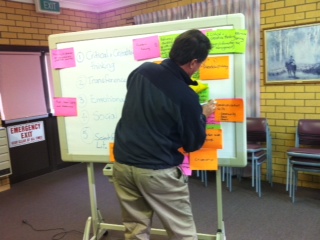Tomorrow we're announcing a new wiki site -
Designing for blended and flexible learning - which is designed to CSU support course teams in their investigations of BFL and how they might achieve the right 'blend' of learning opportunities within their own courses. This is a sneak preview!
The site isn't about providing step by step instructions about what you tools you should use, what spaces you should set up and so on. Instead, it provides a set of
underlying principles that your course might aspire to, and asks you to integrate those which resonate with your team into any current set of principles or model that you are working from. Then, as a way towards operationalising these principles, it suggests you consider your course from 5 different perspectives -
pedagogy,
interactions,
learning spaces,
ICTs and
multi-literacies - as a way of reducing the complexity of course redesign as you work towards a cohesive strategy for enhancing BFL within your course.
The development of the site is strongly influenced by the work of
Lave and Wenger (1991) on situated learning, as well as that of Jane Hart, Jay Cross, Harold Jarche and Clark Quinn on
informal learning in the workplace. We wanted to create a resource that people could use and interact with in their own space and time, when they needed it - a support for their own formal and informal learning. We wanted something that was dynamic, sustainable in that it is easy to maintain to keep pace with new developments and resources, and able to easily incorporate contributions from others in the CSU community. We wanted something that people could 'dip into' depending on their interests, contexts, experience and needs, not something that had to be worked through in a linear fashion from woe to go. In short, we were looking for an efficient, effective path that made it easy for people to get what they need when they need it. We hope we've gone some way towards achieving that, but time will tell. :)
You can read more about the site, and how it's been set up, in the
overview. Some typical questions are also answered in our
FAQs. We'd love to hear your feedback on the site: please leave a comment here or email fli@csu.edu.au directly!


